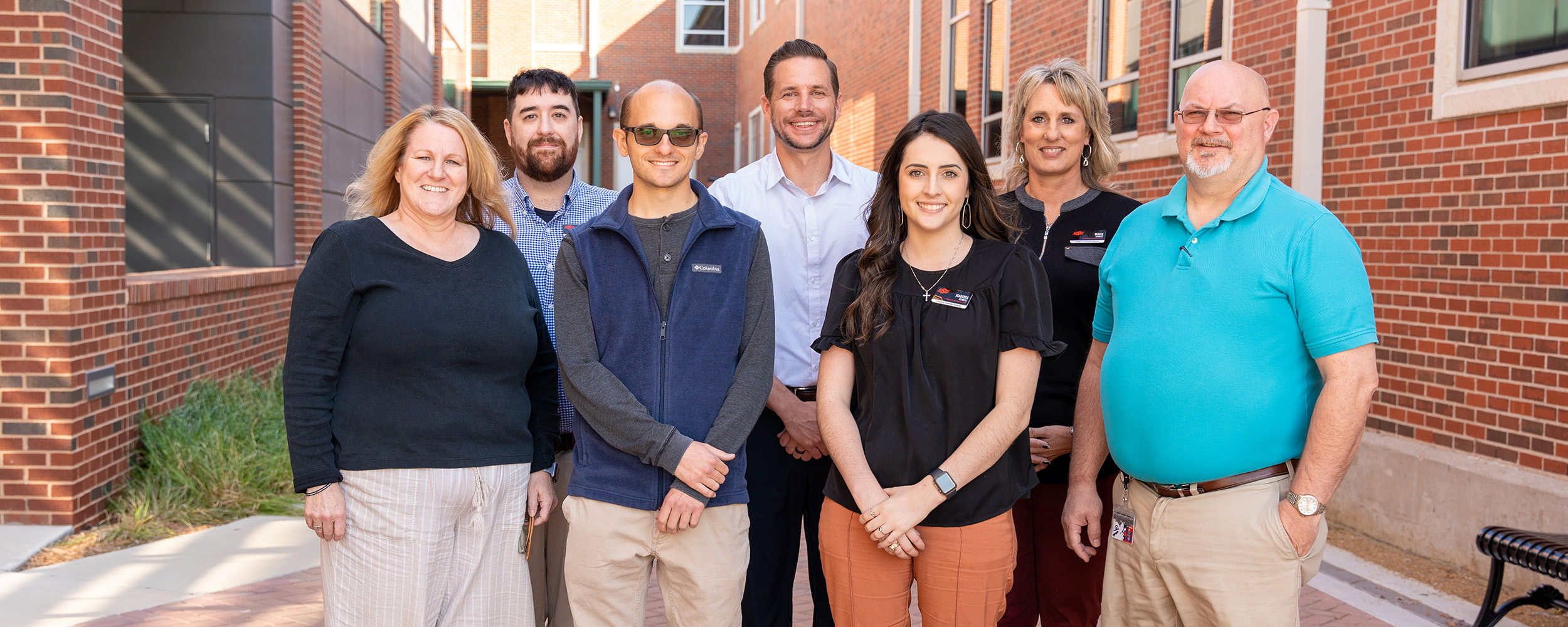
New office aims to support faculty with centralized management of curriculum delivery
Friday, February 24, 2023
Media Contact: Kaylie Wehr | Coordinator, Marketing and Public Relations | 405-744-6740 | kaylie.wehr@okstate.edu
The demands of faculty are many. From preparing lectures to holding office hours along with grading, finding the time necessary for faculty development is difficult.
The Oklahoma State University College of Veterinary Medicine’s administration team saw this need and began exploring how they could provide additional support to faculty.
“The complexity of veterinary education has exploded over the past several years,” said Dr. Jerry Ritchey, associate dean for academic and student affairs. “The administrative burden of instruction has become unmanageable for faculty with other responsibilities, including clinics and scholarly activity.”
In their search, the administration team observed a model used by several medical schools, including the OSU Center for Health Sciences. The success of these programs — partnered with the need to meet the growing demands of veterinary education — led the administration to move forward with creating a similar program at the CVM.
The program at the OSU-CHS was administered under the umbrella of the Office of Educational Development, which was created by Dr. Brandy Close. The office provided academic assistance and instructional designers to run the curriculum and help with curriculum delivery. Close saw how the vet college could benefit from this model.
“What I saw here at the vet school were a lot of parallels with the Center for Health Sciences in terms of its purpose, goals and what it’s producing,” Close said. “I saw faculty being very busy and being pulled in a lot of directions and really struggling to get that faculty development piece, or they were bogged down with the day-to-day management of their courses.”
Close joined the CVM as the director of Curricular Affairs, Instructional Design and Academic Technologies, in late 2021 and the Office of Curriculum and Educational Support was established in January 2022.
“The overall mission of OCES is to support faculty efforts in a way that takes things off their plate so they can dedicate more time to the teaching process,” Close said. “It is a trio of an instructor of record, an academic assistant and an instructional designer to help manage the course overall.”
The OCES achieves its mission in three major ways, Ritchey explained.
“First, there is improved course delivery and educational experience for both faculty and students because of improved efficiency in all aspects of course delivery,” Ritchey said. “OCES also provides ongoing faculty development opportunities for faculty focused on improving instructional effectiveness.
“Lastly, there is improved faculty performance related to mitigation of administrative duties, allowing instructors to focus on course content and their other responsibilities in the clinics, scholarly activity and revenue generation.”
In addition to helping faculty with course delivery and management, OCES also plays a huge role in the accreditation process as it relates to the curriculum and assessment.
“We manage all of the course-level assessment data,” Close said. “Through this, we have the alignment of our curriculum, instructional strategies and content, and assessments. This way, we ensure that we are creating clinicians that are ready to go out and be a general practitioner.”
In addition to Close, OCES has six other employees to ensure support is seamless and timely. Dan Thompson serves as the assistant director of faculty development, working with faculty as a whole, and each class year has a dedicated academic assistant. The first-year assistant is Tim Grischkowsky, the second-year assistant is Marissa Schultz and the third-year assistant is Andrew Porter.
While the first three years are dedicated to classroom basics, the fourth year is devoted to clinical rotations and has different needs. It takes a duo to support the fourth-year educational needs. Adam Naff is the primary academic assistant and Marie Hughes is responsible for the externships.
“We have grown really fast and all the pieces are in place now,” Close said. “We have accomplished a lot in a short amount of time. It is really exciting and I think we are already making a big difference in faculty satisfaction.”
Although it has only been a short time since OCES began supporting faculty, that support has made a huge impact. Dr. Susan Fielder, an assistant professor in the veterinary pathobiology department, is thankful for the team’s experience and willingness to help.
“As faculty, I have many responsibilities beyond the classroom and taking the time to find and learn how to use new resources or technology can be very time-consuming,” Fielder said. “The folks in OCES have extensive experience in many of these areas and have often offered services that I didn’t know existed. They have taken many administrative responsibilities off my plate, allowing me to concentrate on teaching the students the material they need to learn.”
Dr. Valerie McElliott, assistant professor in the veterinary pathobiology department, has also benefited from OCES assistance.
“Having OCES at our institution has definitely saved me more time when it comes to administering, constructing and grading exams, as well as with some assignments,” McElliott said. “It has provided me the opportunity to spend more time engaged in service, teaching and collaborative research opportunities.”
Through the support of OCES, faculty now have the time needed to explore new ways of engaging students and presenting material that will have a positive impact on the student learning experience.
“We have a great team,” Close said. “I truly think they enjoy what they are doing for the college and for the faculty and they feel like they are making a difference, and we are.”
Photo By: Taylor Bacon, Story By: Kaylie Wehr | Vet Cetera
